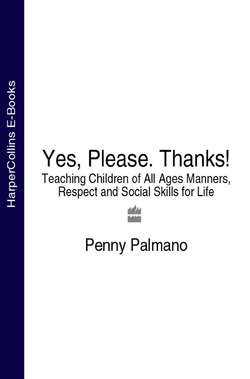Читать книгу Yes, Please. Thanks!: Teaching Children of All Ages Manners, Respect and Social Skills for Life - Penny Palmano - Страница 50
SOLUTION
ОглавлениеDivorce – Although doctors are in general agreement that children are better off with one happy parent rather than two unhappy parents, the trauma of divorce takes its toll on everyone concerned. As adults, parents must put their children’s well-being before their own feelings of hurt.
Few divorces are harmonious and usually one parent is far more embittered than the other, but however wronged you feel, however much you now despise your ex, never, ever, use your children as some sort of emotional pawn. They have done nothing to deserve it. Your children still love both parents and however much you want them to hate your ex as much as you do, leave your children out of it. Avoid saying awful things about your ex to them or somebody else in their hearing range. It is hard enough for children when their parents separate so don’t make it worse by trying to get the children to take sides. A few years down the line you may be happier than ever with a new partner but your children may carry their emotional scars for the rest of their lives. And don’t make it difficult for your ex to see the children; why punish the children?
If only one good thing can come out of your divorce make it your children’s smooth passage from a two-parent family to two single-parent families.
Children often blame themselves for divorce so they will need extra physical contact and love for reassurance. Depending on their ages, explain what is happening, and I don’t mean, ‘Your father’s a filthy, lying, cheating swine,’ but a simple, ‘Sometimes adults don’t get on any more and don’t want to live together, but Daddy and I both love you very much.’
Anger – Do not wait until your daughter hits her brother for the fourth time. After the first whack take her away from the action to a quiet spot to cool off. Explain very firmly that you must never hit another person and as an immediate penalty reduce her TV time that day. Let her have a five-minute cool-off period. She must apologize to her victim, then taking hold of her hand or putting your arm around her, talk to her about her anger and try and get to the bottom of it. Just because she hit her brother does not necessarily mean that her brother is the cause of her anger.
However angry you are with children never shout, call them names or hit them. This will only teach them that they can deal with their anger by behaving in an aggressive and verbal way. Explain to your child that it is perfectly normal to get angry but they must learn to control it and perhaps the next time she wants to hit her brother to move away from the situation or to come and see you or go and hit the pillow on her bed.
Isolated incidents can be dealt with quickly but repeated shows of aggression suggest a deeper-lying problem. Try and find out the cause of the problem by talking to them but if the aggression persists, seek professional help.
Illness – Depending on their age, explain the illness. Try and reassure your children that everything possible is being done to help cure the patient and a home-made get-well card would really cheer them up.
School – If you suspect there is a problem at school, whether academic or social, ask your child first, but if they are not forthcoming contact your child’s teacher. If you suspect your child is being bullied, immediately make an appointment to see the head of the school.
Frustration – Talk to your children about friends, school, activities and the family to try to discover the root of the frustration and then help to dispel it.
